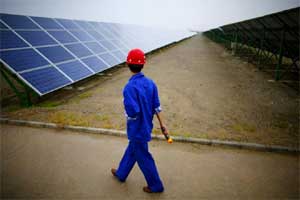In what bore testimony to the viability of the ambitious National Solar Mission (NSM), US-based renewable energy firm SunEdison, which bagged the entire 500 MW capacity on offer in the e-reverse bidding that concluded in the early hours of Wednesday, quoted a tariff of R4.63 per unit, the lowest price discovered under solar tenders in the country so far.
Analysts said the fact that the latest bids were invited by state-run NTPC, which is in better financial health compared than the debt-laden state electricity boards that had issued the tenders in the earlier rounds, must have helped in the price discovery.
NTPC is the nodal agency for 500 MW of solar capacity to be installed at the Ghani Solar Park under the NSM, in Andhra Pradesh’s Kurnool district.
“The low tariff is a function of risk elimination related to land acquisition, transmission corridor and also the strong balance sheet of the counter-party, NTPC,” Pasupathy Gopalan, president of SunEdison’s Asia Pacific operations, told FE. Apart from SunEdison, SoftBank’s joint venture SBG Cleantech, Renew Solar Power and ACME Solar Holdings, among others, had quoted tariffs below R5 a unit, sources said. A total of 28 firms participated in the final round of the bidding.
In all but one of the previous rounds, the average winning bid was higher than the latest price discovered by NTPC by at least R1 per unit.
While the winning bids hovered well over Rs 6 per unit in November last year, they had come down to an average of Rs 5.73 a unit for the 2,000 MW tenders floated by Telangana in August this year. Before Telangana, Madhya Pradesh’s tender for 300 MW had attracted the lowest tariff of Rs 5.05 per unit in July but the average winning price remained above Rs 5.50 a unit.
“The ultimate buyers of any power in India are the state-owned distribution companies which are mostly in poor financial health. Payment delays and rising receivables can upset both financial plans as well as cash flow management,” Sumant Sinha, chairman & CEO of Renew Power, wrote in The Economic Times recently. Experts say that solar companies load risk associated with non-payment or delayed payment from SEBs on to their tariffs, which leads to higher cost of solar power for bids invited by the state government. However, this varies from state to state, depending on their financial condition. “NTPC as a nodal agency was definitely one of the major reasons for an all-time low bids,” Jasmeet Khurana, head, market intelligence, at solar consultancy firm Bridge to India told FE.



